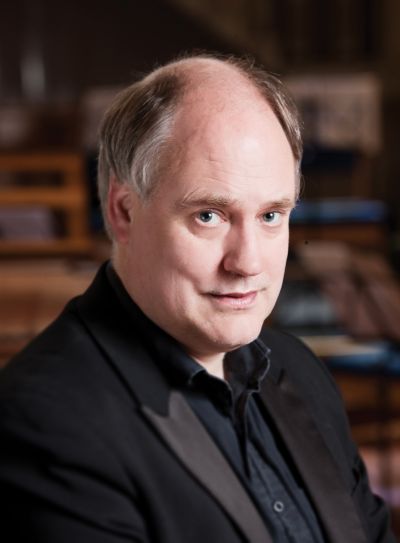Worthy wind playing lifts conductor Butt’s uneven MOB debut

Antonio Vivaldi was at the center of Music of the Baroque’s program Monday night at the Harris Theater. The Venetian “Red Priest” wrote over 400 concertos during his life, though MOB guest conductor John Butt quipped from the stage that some think he wrote the same concerto 400 times.
The program as a whole, which also examined Vivaldi’s influences and those he in turn inspired, actually showcased the composer’s variety, though the musical results were uneven over the course of the evening.
Butt opened his MOB debut with music of Corelli. A generation older than Vivaldi and renowned in his lifetime, Corelli’s concerto grossi were a precursor to Vivaldi’s concerto style.
Butt, who is a professor at the University of Glasgow and musical director of Edinburgh’s Dunedin Consort, led a flowing, grammatical performance of the Concerto Grosso in F Major, Op. 6, no. 6, though here and throughout the evening, movements’ opening bars were often insecure. Front-desk violinists Kathleen Brauer and Sharon Polifrone, with cellist Paul Dwyer made a solid concertante trio, making refined solo contributions.
The first of the evening’s three Vivaldi concertos ensued, the Bassoon Concerto in C Major, RV 472, with CSO assistant principal William Buchman in the spotlight. Buchman has played continuo for MOB for decades, and his pitch-perfect harmonic grounding over the years has been a rock in the ensemble. He was equally at home in front of the orchestra Monday night, playing with a supple, flexible tone, and untroubled technique in the bookending fast movements. He eloquently sang the haunting aria of the central Andante molto, adorned with tasteful ornamenting filigree.
Bach’s Orchestral Suite No. 1 in C Major followed, with Butt making illuminating comments about Vivaldi’s influence on the Leipzig titan. Butt led from the harpsichord throughout the evening, but the choice was questionable here. One wanted more sweep and grandeur in the opening Ouverture, and the ensuing dances felt flat and generalized, the unique character of each lost as Butt appeared lost in his score. Oboes Jennet Ingle and Erica Anderson were joined by Buchman (back in his usual seat), and offered pristine playing in their many solo moments, when not drowned out by carelessly balanced strings.
The oboe remained center stage in the Oboe Concerto in D Minor, Op. 9, no. 2 by Tomaso Albinoni, a Vivaldi contemporary. Principal oboist Anne Bach was in the solo role, and spun a glorious line in the concerto’s luminous central Adagio, Butt keeping the gently undulating string accompaniment at bay. The outer movements were not quite as transporting, with one wanting more assertion from Bach, though she performed with elegance and poise.
Two further Vivaldi concertos closed the program, the Concerto for Strings in A Major, RV 158, and the Concerto for Flute, Oboe & Bassoon in F Major, RV 570. The former is Vivaldi in his open-air, Four Seasons mode, though this modest work is frankly the kind of music that can use a little help. Butt instilled little variation here, and the performance felt superficial, with whatever intricacies the score held passed over.
The final work is a retooling of one of Vivaldi’s “La tempesta di mare” (“storm at sea”) concertos, most commonly heard for solo flute. (This is one instance where Vivaldi really did write the same piece multiple times.) Principal flute Mary Stolper joined Bach and Buchman in the solo trio, and made an assertively stormy impression with them in the opening Allegro. Stolper struggled in the central Largo, her tone frequently cutting out in sustained moments. Still, she recouped well to close the evening on sure footing with her colleagues in the racing final Presto.
Nicholas Kraemer conducts Music of the Baroque’s in Handel’s Messiah 7:30 p.m. November 28 at the North Shore Center and November 29 at Harris Theater. baroque.org
Posted in Uncategorized




